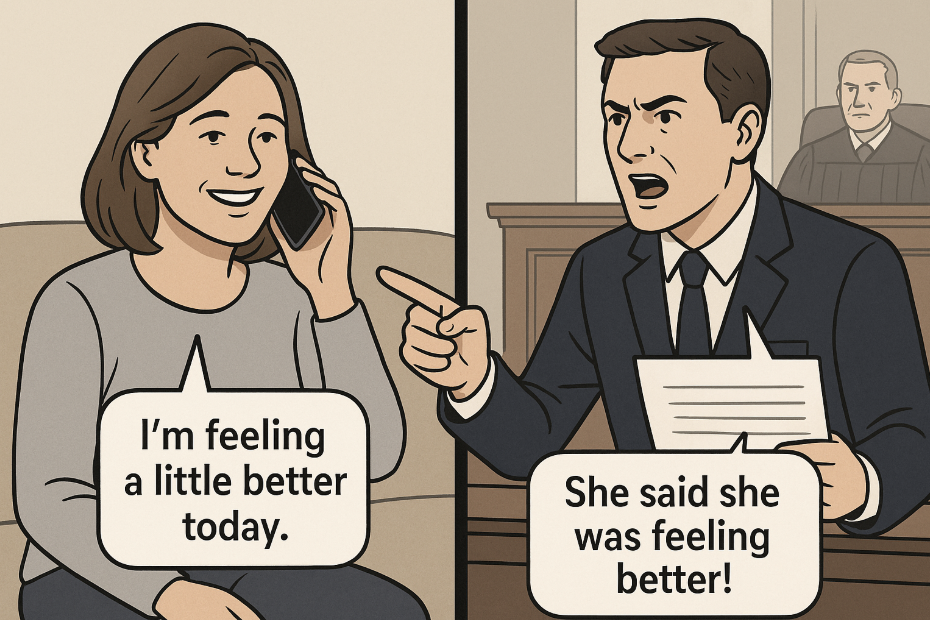If you’ve just been in a car crash or suffered a slip-and-fall, you might be hurting, anxious, and unsure of what comes next. Unfortunately, what you do in the hours and days after an injury matters.
Injury cases are more than medical bills and missed work. They’re legal battles where insurance companies use your words, actions, and even your social media posts against you. Every mistake you make before contacting an attorney can lower your compensation or kill your claim entirely.
That’s why we’re walking through the five most common mistakes injury victims make before calling a lawyer. Read this before you talk to the insurance company.
1. Don’t Give a Recorded Statement to the At-Fault Insurer
You may be surprised how fast the other driver’s insurance company calls you. They’ll sound friendly. They’ll act concerned. But make no mistake: they’re not your friend. They’re trained to minimize your payout.
Why This Is So Dangerous:
- Adjusters receive ongoing training to elicit damaging statements.
- Indiana is a one-party consent state, so they can record your call without your knowledge.
- Even innocent phrases like “I’m feeling a little better today” can be used to argue you weren’t really hurt.
Common Tactics:
- “Would you agree you were going a little fast?”
- “You seemed okay at the scene, right?”
- “Maybe it wasn’t a serious crash after all?”
These are leading questions designed to get you to accept some blame, which lowers your recovery or lets them deny the claim outright.
What to Say Instead:
Be polite but firm. Say, “I’m not prepared to discuss the details right now,” or “My representative will be in touch.” Then call an Indiana injury attorney who can take it from there.

2. Seek Medical Attention Immediately (and Follow Through)
It’s human nature to try to “tough it out.” But in personal injury law, that approach can cost you real money. Delays or gaps in medical treatment are red flags to insurance adjusters and to juries.
Real-Life Example:
Let’s say you get rear-ended, your neck hurts a bit, but you skip the ER and try to shake it off. Two weeks later, your back pain becomes unbearable, and you finally get checked out. Now, the insurer will argue: “If it really hurt, why didn’t you go right away?”
Indiana Law Requires You to Try to Get Better
That means:
- Following all doctor recommendations
- Attending physical therapy
- Taking prescribed medication
- Not skipping appointments
When a jury sees you making a genuine effort to recover, they’re more likely to support you.
What to Do If You Can’t Go Right Away:
At the very least, email or message your doctor the same day. Say: “I was in a car crash, and I’m feeling sore. What do you recommend?” That creates a time-stamped record you were hurt, even if life got in the way of an immediate visit.
3. Preserve Evidence Immediately (Don’t Wait for the Police Report)
A clean police report helps—but it’s not always guaranteed. Your best bet is to start gathering evidence at the scene.
Here’s What You Should Capture:
- Photos: Vehicle damage, license plates, injuries, road signs, skid marks, traffic signals
- Video: Scene overview, bystander commentary, weather conditions
- Witnesses: Ask someone nearby to snap a few photos and text them to you—now you have a witness and their number.
Even if you’re being taken away in an ambulance, ask someone to take pictures. A single photo can make the difference between winning and losing your case.
Additional Tip:
Look around the crash site for homes or businesses with Ring cameras. These often capture footage that supports your story. Your attorney can request footage—but only if you tell them early.
4. Stay Off Social Media—It Can Wreck Your Case
You may want to post a quick update: “Car crash today. I’m feeling blessed to be alive.” Seems harmless, right? Not in the hands of a defense attorney.
Why It’s So Dangerous:
- Social media posts are evidence.
- Insurance companies can (and will) subpoena Facebook, Instagram, TikTok, etc.
- Even deleted posts can be recovered.
- A picture of you smiling at a birthday party can be twisted into “you weren’t really hurt.”
Real Scenario:
You post, “Finally made it to the gym today, woohoo!” What you meant was: “First time at the gym since the crash and I limped through 10 minutes of stretching.” What the insurance lawyer will argue is: “You’re working out and loving life.”
Play It Safe:
- Go private
- Stop posting
- Don’t comment on the crash, your injuries, or your medical treatment
5. Waiting Too Long to Call an Injury Attorney
Indiana gives you two years from the date of injury to file a lawsuit, but if you wait until month 18 to get legal help, your case is probably already a mess.
Here’s What Can Go Wrong Without an Attorney:
- You unknowingly give a damaging statement
- You miss crucial medical appointments
- Evidence disappears
- Surveillance footage is deleted
- The insurance company strings you along with “we’re reviewing it” until it’s too late
Why You Need a Lawyer ASAP:
- It costs nothing upfront. Most personal injury attorneys only get paid if you win.
- Your attorney can protect your statements, manage your bills, and avoid nasty surprises like liens (where your health insurer demands repayment from your settlement).
What Does an Indiana Injury Attorney Actually Do?
We get this question a lot. Here’s a breakdown of how we protect and empower our clients:
Before a Lawsuit Is Filed:
- Communicate with all insurers
- Gather photos, videos, witness statements
- Monitor and organize your medical treatment records
- Protect you from lowball settlement offers
- Challenge false blame-shifting
- Attempt to maximize a settlement
If a Lawsuit Becomes Necessary:
- File your claim within deadlines
- Hire investigators or expert witnesses
- Represent you in depositions, hearings, and (if needed) at trial
An experienced injury attorney gives you leverage, protection, and peace of mind—things you don’t get by going it alone.
Bonus Tips: How to Help Your Injury Attorney Help You
- Save everything: Medical receipts, prescription records, parking validations
- Track time off work: Ask HR for documentation
- Keep a pain journal: Write daily or weekly notes on how you’re feeling
- Ask questions: We’re here to guide you, not judge you
- Be consistent: Don’t say “I’m fine” to your doctor and “I’m in agony” to your attorney—these statements will conflict
Frequently Asked Questions
Q: Can I talk to the insurance company at all?
A: If it’s your insurance, yes—but we strongly recommend you still speak with an attorney first. If it’s the at-fault driver’s insurer, absolutely not.
Q: I didn’t go to the ER—did I ruin my case?
A: Not necessarily. But you need to get medical attention now, and you should explain the delay to both your doctor and your attorney.
Q: What’s a lien, and why does it matter?
A: A lien is when your health insurer (or government benefits program) demands reimbursement from your settlement. Your attorney will negotiate these to protect your payout.
Make the Right Call
At the Marc Lopez Law Firm, we know injury cases aren’t just about money—they’re about protecting your health, your family, and your future. You’ve already been hit once. Don’t let the insurance company take another swing at you.
If you’re dealing with an Indiana injury and feeling overwhelmed, contact us today at 463-282-3514. We’ll deal with the stress and strategy so you can focus on healing.



